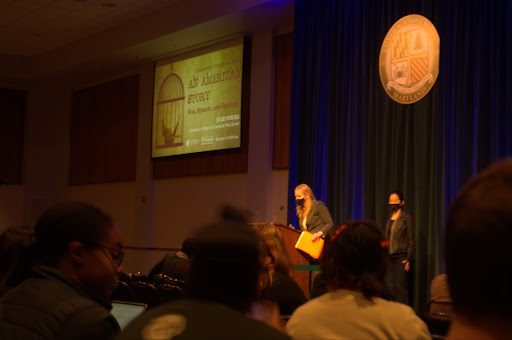Author Julie Otsuka Headlines the Humanities Symposium Keynote Address
McGuire Hall was filled to capacity to hear the culminating talks of the Humanities Symposium by author Julie Otsuka. Otsuka wrote the book “When the Emperor was Divine” a novel based on her family’s experiences in the internment camps of World War II. The book is thought-provoking and hundreds of students who had read the book packed the hall in hopes of asking her a question. The book follows a family of unnamed Japanese-Americans as they are pried away from their home and lives and sent to an internment camp.
“Japanese-Americans were even more hated after the war than before and people assumed because the Japanese-Americans had been sent away that they must have been guilty. My mother’s family was financially ruined by the war, they lost everything,” Otsuka said.
The family is intentionally left nameless to show how their experiences were shared among any, and all Japanese-Americans. The story also elucidates the injustices perpetrated by the U.S. government and forces the readers to confront what our government has done. Some school districts and people were very uncomfortable confronting this truth.
“I traveled across the country and spoke to thousands of students and I never encountered any pushback until last year, when the book was banned from being taught in a high school English class in Muskego, Wisconsin,” Otsuka said. “The reasons they gave for the ban are as follows, the book was too sad… too poetic, too one sided, and didn’t show the ‘American perspective.’”
The book being banned caused an outpouring of support and people within the community came to her defense. She tried to explain that the Japanese people who had been interned were Americans, and not at all associated with the Imperial Japanese. Members of the school board attempted to justify the internment of Japanese-Americans and tried erasing racist parts of our nation’s past. To Otsuka’s surprise, people began to stand up against the banning of the book.
“The school board’s attempt to whitewash history was met with fierce opposition by local parents, students, and high school alumni. Over 300 people signed a petition urging the school board to reconsider,” Otsuka said. “Money was raised to purchase and distribute 100 free copies of my novel; there were rallies and teach-ins… and this in a deeply conservative town… it was a beautiful thing to watch.”
Hundreds of students packed into McGuire Hall and eagerly asked their questions. Otsuka’s story was written with a level of humor and detail unique to her writing. The novel, first published in 2002, is still talked about in 2023. Otsuka described the themes of her novel as eternal and based on the high level of discussion between students and Otsuka, her assessment rings true. Some of the most interesting questions posed by students pertained to the suppression of her cultural identity growing up. She expressed regrets about her childhood, not being taught Japanese or learning much about her heritage until college.
“As a child, I didn’t know what I was missing … There was a part of me that felt a great lack, there is so much that I don’t know and I encourage anyone especially when you’re young to ask parents because they are a goldmine,” Otsuka said. “It was twenty years after the war had ended when I was brought up, so in my generation it was typical to bring up the kids as all-American.”














































































































